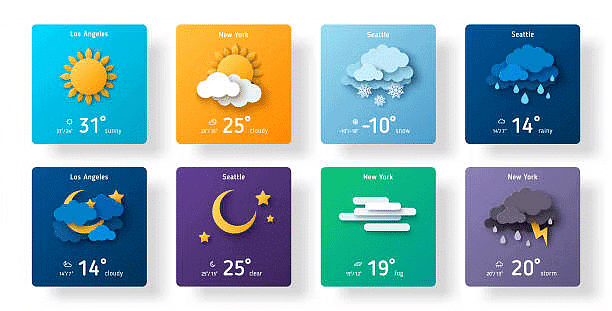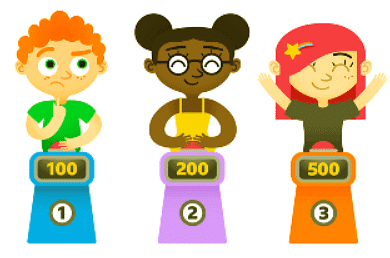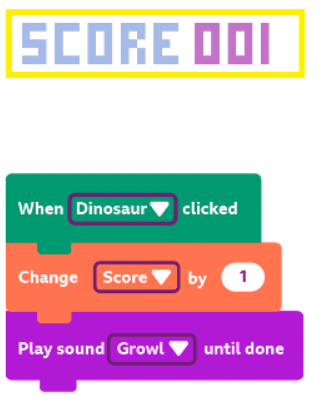Year 3 Exam > Year 3 Notes > Year 3 Computing > What is a variable and how do computers use them?
What is a variable and how do computers use them? | Year 3 Computing PDF Download
| Table of contents |

|
| Variables |

|
| Things that change |

|
| Familiar Variables |

|
| Using variables in computing |

|
| What does a variable look like in a computer game? |

|
| What would the code look like for a variable? |

|
Variables
- A variable is like the changing weather; it represents a piece of data that can vary or be altered by a program.
- Just as the weather can shift from cloudy to sunny to rainy, variables can change from one value to another.
- Variables are placeholders for different types of information that can be modified during program execution.
Things that change
- Variables can be like the weather, always shifting and unpredictable. We track these changes using tools like weather maps or daily forecasts.
 Other things change by increasing or decreasing, like scores in a game, which we track on scoreboards.
Other things change by increasing or decreasing, like scores in a game, which we track on scoreboards.- Increasing: When something gets larger
- Decreasing: When something gets smaller

Question for What is a variable and how do computers use them?Try yourself: What do variables represent in a program?View Solution
Familiar Variables
One common variable is the date, seen on schoolwork, changing daily.
Parts of the date change at different rates:
- Year: Changes every 365 days, except in leap years with 366 days
- Name of the Month: Changes every 4 weeks and repeats after 12 months
- Name of the Day: Changes every 24 hours and repeats after 7 days

We track these changes using tools like calendars or diaries.
Using variables in computing
- In computing, we use the term "variable" to describe a location in a computer's memory where information that changes can be stored.
- Think of a variable like a box or container in which the contents can vary or change over time, while the box itself remains the same.
- Computers can store multiple variables in their memory, each identified by its own unique name.
- This functionality is valuable because we can refer to the variable's name whenever we need to access or manipulate what is stored inside the box.
- For instance, in a program controlling an automatic car park barrier, a variable can track the number of cars entering and exiting, helping decide whether more cars can be allowed in.
- Similarly, in a mobile phone alarm app, a variable can store different time settings for alarms—such as an early start on weekdays and a later time on weekends for those who want to sleep in.
What does a variable look like in a computer game?
- Introduction to Variables:
- In computer games, variables are crucial components used to store and manipulate data. They act as placeholders for various values that can change during gameplay.

- Example: Dinosaurs and Doughnuts Game
- In the game "Dinosaurs and Doughnuts," a computer programmer has devised a set of instructions, known as an algorithm, to dictate the game's behavior.
- Imagine a variable in this game as a container that holds information about the player's score, health points, or the number of items collected.
- Role of a Variable:
- Variables in a game can represent diverse data, such as the player's position on the screen, the speed of a moving object, or the level currently being played.
- For instance, a variable "playerScore" could keep track of the points earned by the player throughout the game.
- Dynamic Nature of Variables:
- Unlike constants, variables can change their values during gameplay based on interactions, events, or calculations.
- For example, a variable "playerHealth" might decrease when the player encounters obstacles or enemies.
- Importance of Variables in Game Development:
- Variables are fundamental for implementing game logic, creating interactive experiences, and managing game states.
- They enable developers to control and update game elements dynamically, enhancing gameplay complexity and engagement.
- Conclusion:
- Variables in computer games play a pivotal role in shaping player experiences, enabling dynamic interactions, and facilitating the implementation of game mechanics.
- Understanding how to effectively utilize variables is essential for game developers to create immersive and engaging gaming experiences.
Question for What is a variable and how do computers use them?Try yourself: In a racing game, which of the following would be an example of a variable?View Solution
What would the code look like for a variable?
- The computer programmer has created a variable named "score" and displayed it on the game screen so players can see the current number inside.
- Here's how the program code might appear for the initial part of the algorithm:
- When a dinosaur is clicked, add one point to the "score" variable and play a growling sound.
- Now, considering if the player clicks on a doughnut, let's revisit the original algorithm for the game:
- If you click on a doughnut:
- Subtract one point from the "score" variable.
- Play the error sound.
- If you click on a doughnut:
- These steps ensure that the game responds appropriately whether the player interacts with a dinosaur or a doughnut, adjusting the score and auditory feedback accordingly.

The document What is a variable and how do computers use them? | Year 3 Computing is a part of the Year 3 Course Year 3 Computing.
All you need of Year 3 at this link: Year 3
|
13 videos|26 docs|8 tests
|
FAQs on What is a variable and how do computers use them? - Year 3 Computing
| 1. What is a variable in computer programming? |  |
Ans. A variable in computer programming is a named storage location in memory that holds a value. It is used to store data that can be changed or manipulated during the program's execution.
| 2. How do computers use variables in programming? |  |
Ans. Computers use variables in programming to store and manipulate data. Variables can store different types of data such as numbers, text, or boolean values, and can be used in calculations, comparisons, and other operations within a program.
| 3. Why are variables important in computer programming? |  |
Ans. Variables are important in computer programming because they allow programmers to store and work with data efficiently. By using variables, programmers can easily access and modify data throughout the program, making it easier to write and maintain complex code.
| 4. What are the different types of variables used in computer programming? |  |
Ans. In computer programming, there are different types of variables such as integers, floating-point numbers, characters, and boolean values. Each type of variable is used to store a specific type of data, and programmers must declare the type of variable they are using before assigning a value to it.
| 5. How can programmers declare and initialize variables in computer programming? |  |
Ans. Programmers can declare and initialize variables in computer programming by specifying the variable's name, data type, and initial value. For example, in languages like Java, a variable can be declared and initialized as follows: int num = 10; This statement declares a variable 'num' of type integer and initializes it with the value 10.
Related Searches














